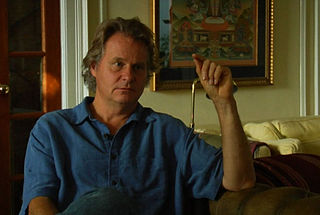A Quote by Wyndham Lewis
The Future is distant, like the Past, and therefore sentimental. The mere element "Past" must be retained to sponge up and absorb our melancholy. Everything absent, remote, requiring projection in the veiled weakness of the mind, is sentimental.
Quote Topics
Related Quotes
What you think of as they past is a memory trace, stored in the mind, of a former Now. When you remember the past, you reactivate a memory trace -- and you do so now. The future is an imagined Now, a projection of the mind. When the future comes, it comes as the Now. When you think about the future, you do it now. Past and future obviously have no reality of their own. Just as the moon has no light of its own, but can only reflect the light of the sun, so are past and future only pale reflections of the light, power, and reality of the eternal present. Their reality is "borrowed" from the Now.
When I'm driving past the place I used to work, or when I'm driving past the comedy studio where I used to take photos in exchange for classes, or when I'm driving past the yoga studio I used to clean on the weekends - it's not that far removed from me yet. I get very sentimental over things like that.
Our world does not exist from its own side--like a dream world, it is a mere appearance to our mind. In dreams we can see and touch our dream world, but when we wake up we realize that it is simply a projection of our mind and had no existence outside our mind. In the same way, the world we see when we are awake is simply a projection of our mind and has no existence outside our mind.
The Past is dead, and has no resurrection; but the Future is endowed with such a life, that it lives to us even in anticipation. The Past is, in many things, the foe of mankind; the Future is, in all things, our friend. In the Past is no hope; The Future is both hope and fruition. The Past is the text-book of tyrants; the Future is the Bible of the Free. Those who are solely governed by the Past stand like Lot's wife, crystallized in the act of looking backward, and forever incapable of looking before.
It seems to me that the dedication of a library is an act of faith. To bring together the resources of the past and to house them in buildings where they will be preserved for the use of men and women in the future, a nation must believe in three things. It must believe in the past. it must believe in the future. It must, above all, believe in the capacity of its own people so to learn from the past that they can gain in judgment in creating their own future.
The past exists only in our memories, the future only in our plans. The present is our only reality. The tree that you are aware of intellectually, because of that small time lag, is always in the past and therefore is always unreal. Any intellectually conceived object is always in the past and therefore unreal. Reality is always the moment of vision before the intellectualization takes place. There is no other reality.



































